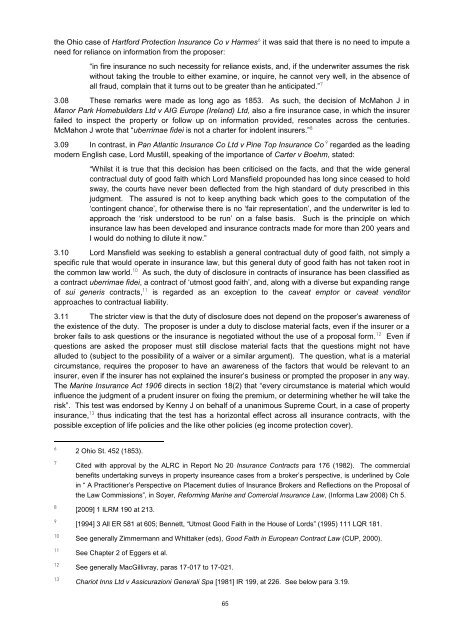Insurance Contracts CP - Law Reform Commission
Insurance Contracts CP - Law Reform Commission
Insurance Contracts CP - Law Reform Commission
You also want an ePaper? Increase the reach of your titles
YUMPU automatically turns print PDFs into web optimized ePapers that Google loves.
the Ohio case of Hartford Protection <strong>Insurance</strong> Co v Harmes 6 it was said that there is no need to impute a<br />
need for reliance on information from the proposer:<br />
―in fire insurance no such necessity for reliance exists, and, if the underwriter assumes the risk<br />
without taking the trouble to either examine, or inquire, he cannot very well, in the absence of<br />
all fraud, complain that it turns out to be greater than he anticipated.‖ 7<br />
3.08 These remarks were made as long ago as 1853. As such, the decision of McMahon J in<br />
Manor Park Homebuilders Ltd v AIG Europe (Ireland) Ltd, also a fire insurance case, in which the insurer<br />
failed to inspect the property or follow up on information provided, resonates across the centuries.<br />
McMahon J wrote that ―uberrimae fidei is not a charter for indolent insurers.‖ 8<br />
3.09 In contrast, in Pan Atlantic <strong>Insurance</strong> Co Ltd v Pine Top <strong>Insurance</strong> Co 9 regarded as the leading<br />
modern English case, Lord Mustill, speaking of the importance of Carter v Boehm, stated:<br />
―Whilst it is true that this decision has been criticised on the facts, and that the wide general<br />
contractual duty of good faith which Lord Mansfield propounded has long since ceased to hold<br />
sway, the courts have never been deflected from the high standard of duty prescribed in this<br />
judgment. The assured is not to keep anything back which goes to the computation of the<br />
‗contingent chance‘, for otherwise there is no ‗fair representation‘, and the underwriter is led to<br />
approach the ‗risk understood to be run‘ on a false basis. Such is the principle on which<br />
insurance law has been developed and insurance contracts made for more than 200 years and<br />
I would do nothing to dilute it now.‖<br />
3.10 Lord Mansfield was seeking to establish a general contractual duty of good faith, not simply a<br />
specific rule that would operate in insurance law, but this general duty of good faith has not taken root in<br />
the common law world. 10 As such, the duty of disclosure in contracts of insurance has been classified as<br />
a contract uberrimae fidei, a contract of ‗utmost good faith‘, and, along with a diverse but expanding range<br />
of sui generis contracts, 11 is regarded as an exception to the caveat emptor or caveat venditor<br />
approaches to contractual liability.<br />
3.11 The stricter view is that the duty of disclosure does not depend on the proposer‘s awareness of<br />
the existence of the duty. The proposer is under a duty to disclose material facts, even if the insurer or a<br />
broker fails to ask questions or the insurance is negotiated without the use of a proposal form. 12 Even if<br />
questions are asked the proposer must still disclose material facts that the questions might not have<br />
alluded to (subject to the possibility of a waiver or a similar argument). The question, what is a material<br />
circumstance, requires the proposer to have an awareness of the factors that would be relevant to an<br />
insurer, even if the insurer has not explained the insurer‘s business or prompted the proposer in any way.<br />
The Marine <strong>Insurance</strong> Act 1906 directs in section 18(2) that ―every circumstance is material which would<br />
influence the judgment of a prudent insurer on fixing the premium, or determining whether he will take the<br />
risk‖. This test was endorsed by Kenny J on behalf of a unanimous Supreme Court, in a case of property<br />
insurance, 13 thus indicating that the test has a horizontal effect across all insurance contracts, with the<br />
possible exception of life policies and the like other policies (eg income protection cover).<br />
6<br />
7<br />
8<br />
9<br />
10<br />
11<br />
12<br />
13<br />
2 Ohio St. 452 (1853).<br />
Cited with approval by the ALRC in Report No 20 <strong>Insurance</strong> <strong>Contracts</strong> para 176 (1982). The commercial<br />
benefits undertaking surveys in property insureance cases from a broker‘s perspective, is underlined by Cole<br />
in ― A Practitioner‘s Perspective on Placement duties of <strong>Insurance</strong> Brokers and Reflections on the Proposal of<br />
the <strong>Law</strong> <strong>Commission</strong>s‖, in Soyer, <strong>Reform</strong>ing Marine and Comercial <strong>Insurance</strong> <strong>Law</strong>, (Informa <strong>Law</strong> 2008) Ch 5.<br />
[2009] 1 ILRM 190 at 213.<br />
[1994] 3 All ER 581 at 605; Bennett, ―Utmost Good Faith in the House of Lords‖ (1995) 111 LQR 181.<br />
See generally Zimmermann and Whittaker (eds), Good Faith in European Contract <strong>Law</strong> (CUP, 2000).<br />
See Chapter 2 of Eggers et al.<br />
See generally MacGillivray, paras 17-017 to 17-021.<br />
Chariot Inns Ltd v Assicurazioni Generali Spa [1981] IR 199, at 226. See below para 3.19.<br />
65

















